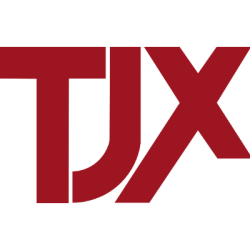
FMP

The TJX Companies, Inc.
TJX
NYSE
The TJX Companies, Inc., together with its subsidiaries, operates as an off-price apparel and home fashions retailer. It operates through four segments: Marmaxx, HomeGoods, TJX Canada, and TJX International. The company sells family apparel, including footwear and accessories; home fashions, such as home basics, furniture, rugs, lighting products, giftware, soft home products, decorative accessories, tabletop, and cookware, as well as expanded pet, kids, and gourmet food departments; jewelry and accessories; and other merchandise. As of February 23, 2022, it operated 1,284 T.J. Maxx, 1,148 Marshalls, 850 HomeGoods, 59 Sierra, and 39 Homesense stores, as well as tjmaxx.com, marshalls.com, and sierra.com in the United States; 293 Winners, 147 HomeSense, and 106 Marshalls stores in Canada; 618 T.K. Maxx and 77 Homesense stores, as well as tkmaxx.com in Europe; and 68 T.K. Maxx stores in Australia. The company was incorporated in 1962 and is headquartered in Framingham, Massachusetts.
119.89 USD
-0.17 (-0.142%)

EBIT (Operating profit)(Operating income)(Operating earning) = GROSS MARGIN (REVENUE - COGS) - OPERATING EXPENSES (R&D, RENT) EBIT = (1*) (2*) -> operating process (leverage -> interest -> EBT -> tax -> net Income) EBITDA = GROSS MARGIN (REVENUE - COGS) - OPERATING EXPENSES (R&D, RENT) + Depreciation + amortization EBITA = (1*) (2*) (3*) (4*) company's CURRENT operating profitability (i.e., how much profit it makes with its present assets and its operations on the products it produces and sells, as well as providing a proxy for cash flow) -> performance of a company (1*) discounting the effects of interest payments from different forms of financing (by ignoring interest payments), (2*) political jurisdictions (by ignoring tax), collections of assets (by ignoring depreciation of assets), and different takeover histories (by ignoring amortization often stemming from goodwill) (3*) collections of assets (by ignoring depreciation of assets) (4*) different takeover histories (by ignoring amortization often stemming from goodwill)